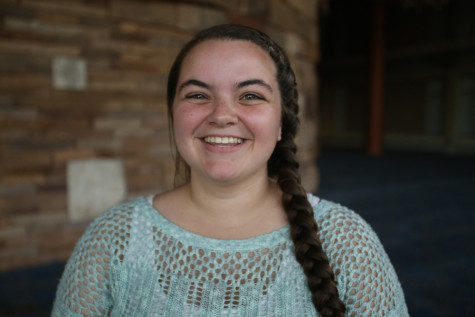Six USI softball players were recognized as NFCA All-America Scholar-Athletes by the National Fastpitch Coaches’ Association for their academic success in 2014-15. To be recognized the players had to earn a 3.5 GPA or higher.
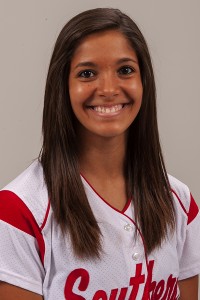
Shelby Tate said in her experience academics are always stressed before athletics in college.
“Our coaches say academics come first,” the junior pre-radiologic imaging sciences major said. “Softball is just a perk we get to have.”
Each team member starts out the year by writing down all of the classes they have taken already.
Then during the yearwhen they attend team study sessions they know who can help whom.
“Our team is always willing to help each other out,” the outfielder said.
Tate said sometimes it is tough to balance athletics, especially when she is currently taking 18 credit hours.
“Once I’m in the program it will be tougher,” Tate said. “I know what it entails, but then again I don’t really.”
She enters the radiological imaging sciences program in the spring when softball’s season begins.
“I guess (the toughest part) is just remembering the fact that I have games,” Tate said. “I need to have all this done by game day.”
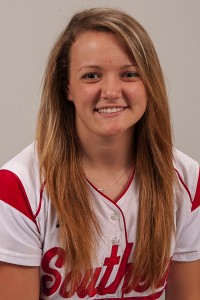
Olivia Clark-Kittleson said she will begin some of her most strenuous courses in the spring.
The physical education major also must focus on her position as an outfielder on the softball team.
“Our number one thing is academics,” she said. “(Our coaches) want us to get a well rounded GPA.”
The team is required to spend time studying each week based on their GPA and their course load.
Clark-Kittleson said last year she completed six hours of required team -study time per week.
“In high school it wasn’t so strenuous travel-wise,” she said. “I have to make sure to talk to my professors and plan to take tests. I had a lot of people help me prepare.”
The sophomore said every college student is guilty of procrastination, but they must strive to stay on top of everything.
The team has study hours during which they all meet, put their phones away, work on homework or study for tests.
This helps because all of the girls on the team have the same practice schedules. They help remind each other they have work to do, she said.
“We are here to get an education,” Clark-Kittleson said, “and to brighten our future.”
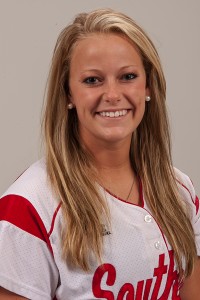
Janna Green said graduating with honors is a big deal.
“I’ve always taken school really serious,” said the senior health services major. “Academic success was instilled in me by my parents.”
To maintain academic success in college she said students have to stay focused and communicate.
“My worst GPA came from my freshman year,” she said. “You have to start early.”
The softball players try not to schedule classes on Friday afternoons to avoid conflict between classes and travel games.
At the beginning of each semester they are given slips for their professors explaining when games are so they have plenty of notice, Green said.
“It’s a basic communication thing,” the centerfielder said. “The teachers understand.”
The team has mandated study hours, but if a player’s GPA falls below a 3.0 they have to complete an extra six hours of study time.
“We’re given the tools,” Green said. “It just matters what you do with them.”
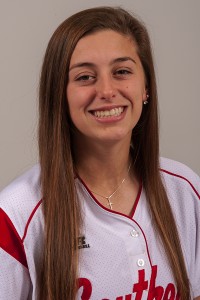
Lexi Reese said time management is an important part succeeding academically.
The public relations major is entering into classes for her major and said some are a lot to take on.
“I’m just really lucky I’m not having to do it in softball season,” she said.
Reese said the university provides a lot of resources, like academic skills, and it is important for students to use them.
Reese said she found earning her degree in public relations would provide her more opportunities for the future.
“I wanted to broaden what I am able to do in life,” the junior infielder said. “This is the rest of your life and you are paying for it. You might as well do well.”
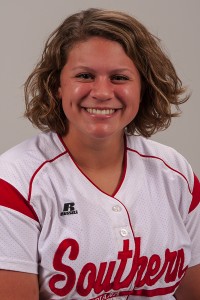
Haley Hodges said building a relationship with her professors is important to success as a student-athlete.
“I like to introduce myself on the first day of class,” the computer science major said. “(The professors) appreciate that.”
During this time she lets professors know of any conflicts that will come up during the year because of softball.
The catcher said it can be hard to balance athletics and academics because softball takes up a lot of time, but studying as a team helps her find that balance.
“The difficult thing about my major is no one else on the team is a computer science major,” she said.
Hodges said despite this the whole team is great at motivating each other to be better academically.
“Sports are something good in college,” she said, “but academics are what is going to take you farther.”
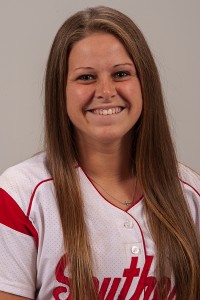
Mackenzi Dorsam is now able to see the importance of academics from the other side after becoming a graduate assistant for the softball team.
She understands that study hours help the team keep a balance.
“You have to study two, four or six hours depending on your GPA,” she said. “It’s one way the team keeps each other accountable.”
Dorsam said she would always utilize a calendar to keep her assignments and classes straight.
“Actually playing a sport kept me more balanced,” she said. “I wrote it all out.”
Dorsam said she knew the importance of using academics to appeal to college coaches.
“(Academics) have always been important,” Dorsam said. “As a coach you don’t want to recruit someone who will hurt you academically.”



